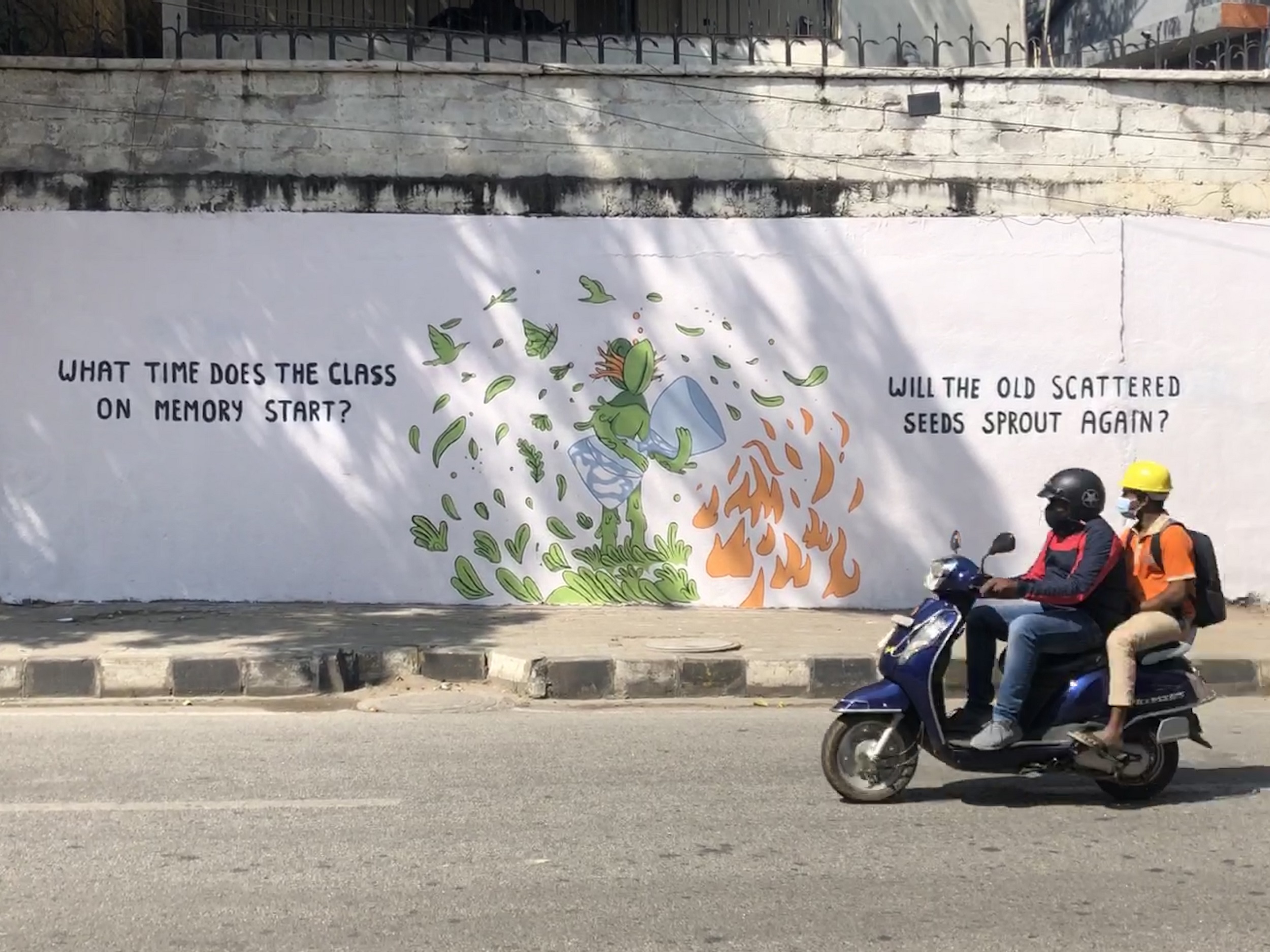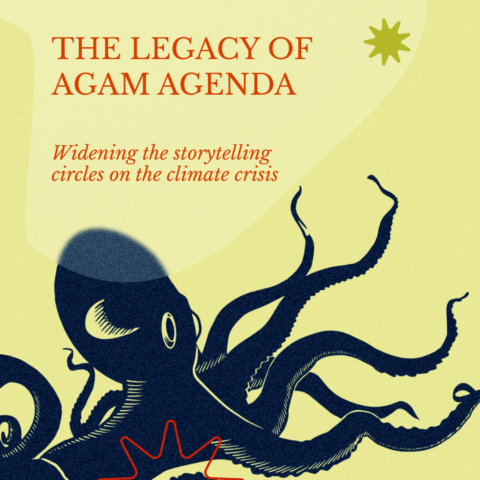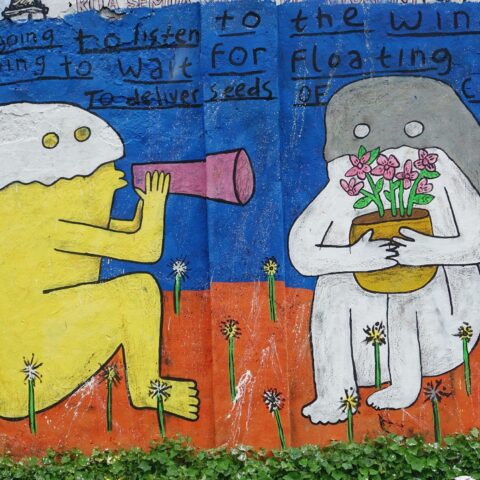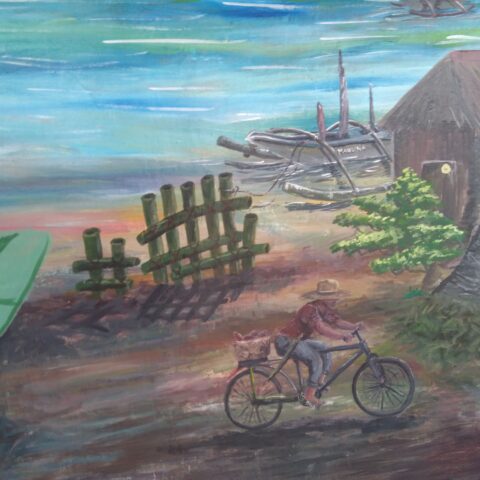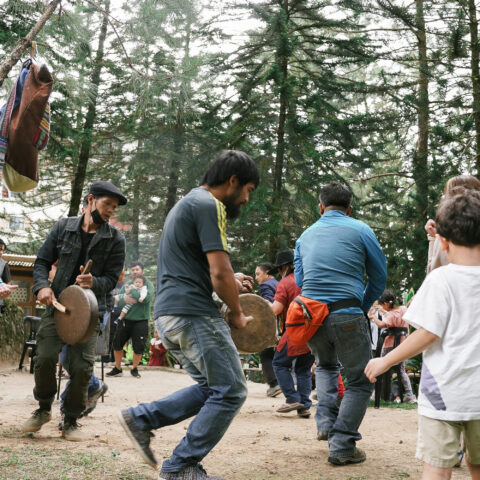Cover Photo: A mural in Bangalore, India in support of the When Is Now campaign. This mural was created by Rohini Kejriwal with collaborator, Mayur Nanda aka Copycat Design. Lines used in the mural are from “Our Bodies Remember” by Wangũi wa Kamonji from Kenya. Photo © Rohini Kejriwal.
By Renato Redentor Constantino
Is it time you join the global poetry rebellion? Most likely. It asks of you only one question, the penultimate inquiry: in the face of the climate crisis, when taking action is the only real option left, when, exactly, is now?
Contribute a seed to the website – a new eight-line poem. Or choose opening lines from any of the earlier submitted seeds to sprout your own. Respond to the question, as poets and artists have done from places such as Guam, Malawi, Nigeria, Nepal, Guatemala, Colombia, and the Philippines. Encourage your niece and neighbor to take part. Share imagery.
We face today the great unraveling, when notions of modernity have returned unembellished as the conceits they always were – the thinking that without consequences we can live large indefinitely off the wealth of the earth with little regard for prospects of regeneration.
Yet today we seem less and less consoled by technical explanations of loss while so few are buoyed by scientific possibilities of renewal. We are bombarded daily by accounts of cascading calamities, each one seemingly exhorting many to look askance, testing further what the Holocaust scholar Carolyn J. Dean once called “the fragility of empathy.”
The magisteria of science and policymaking remain deeply essential to understanding and grappling with the forces unleashed by avarice. But on their own they have also proved insufficient, the questions they pose, limited.
In Frank Herbert’s first book, the Reverend Mother Gaius Helen Mohiam spoke of “a world being the sum of many things – the people, the dirt, the growing things, the moons, the tides, the suns – the unknown sum called nature, a vague summation without any sense of the now.” And Paul Atriedes wondered: “What is the now?”
Beyond numbers is the algebra of our fears. Beyond temperature thresholds, the fractal reckoning of dispossession and discontent. Past the cold caves of calculation measuring atmospheric concentrations in parts per million lies the verve of verse tracing the contours of a world ripe for re-making. Below the stratosphere is the heat of our lives, our stories.
In the poem Our Bodies Remember, the artist in Kenya, Wangui wa Kamonji offered to WhenIsNow an initial seed.
“Come closer,” wa Kamonji beckoned.
Talk to me about my body.
It aches nowadays with such strange pains.
I wonder, do these bodies know their ways
Any longer? And when will they remember?
Will the old scattered seeds sprout again?
Wa Kamonji posed a compelling question:
What time does the class on memory start?
Can you tell me? I don’t want to be late.
Meanwhile, come. Let’s gather close.
This cold pushes knives through
My still young bones. And my chest
Gets thick and heavy, though I carry on breathing.
From wa Kamonji’s seed sprouted a poem from Russia by Daniel Voskoboynik titled When Is Now. Voskoboynik used part of wa Kamonji’s verse for his first line:
do these bodies know their ways any longer?
do our ways remember our bodies?
do these voices still hold their breath?
here in our shattering sanctuaries
a convergence of languages is finding its fluency
the broken blossom, the heavier wave,
the wound too wide for a wound
as grief engulfs the ritual, skies exhale calendars of ending
place your palm on this stretched season: listen, for
attention is memory in motion, a rigour of returning
against the havoc of stubborn silence
world, that is love, that is you
bless what haunts us into healing.
From wa Kamonji’s first offer, two more bloomed: the writer, Robert Macfarlane, author of the celebrated book Underland, branched out with Pack The Hall To The Rafters using a line from Our Bodies Remember to unfurl his fern:
What time does the class on memory start? Can you tell me?
I don’t want to be late, because I want to remember –
When yellow ducks could not swim through the glacier;
When the river was alive and silver as an eel;
When the beech trees had not begun their long walk north;
When soil did not speak in the stars of drought.
So can you show me how to tell the time? How?
Now. The class starts now.
But the clouds are the teachers,
And the seeds, the rain, the air —
So make more room at the back there.
Pack the hall to the rafters, creatures.
From Macfarlane’s branch, a poem titled Frogs Need Friendship grew, tended by the Indian naturalist and author Neha Sinha:
When I asked the tree why she wept, she said her buttress was swept,
In a concrete girdle.
When I asked the frog why he left, he said he was lonely on dry cement.
When I asked the Minister why we loved cement, he said it was meant
For him, me and my country: and dreams of racing, double GDP.
When will we break cement borders, tidy things that commit murders?
When will we ‘phase-down’ to foster frog friendship?
When will we rise to hold trees, not tenders, as mother ships?
We will, tonight. Call my mothers, call my sisters, call my daughters.
So make more room at the back there, Pack the halls to the rafters,
Take root, plant a seed: tonight we decarbonize.
Take root, plant a seed: tonight we decolonize.
